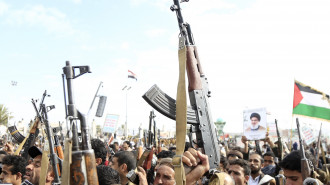Kareem Chehayeb is a Lebanese writer and musician based in Beirut.
Follow him on Twitter: @chehayebk
Opinions expressed in this article remain those of the author and do not necessarily represent those of The New Arab, its editorial board or staff.
Hariri Resigns: Lebanon no longer immune to tensions over Hizballah
While high-level discussions in Lebanon continue, many fear economic decline and another political deadlock, as well as fears over safety and security.
The problems started when Saad Hariri, Lebanon's Prime Minister, resigned his office while visiting Saudi Arabia via the Saudi television channel, al-Arabiya. Hariri's speech condemned Hizballah and Iran's actions in Lebanon and Syria - hardline rhetoric that Hariri hasn't used in years, before adding that he feared for his life. Hariri then compared the situation in Lebanon to the events around the time his father, former prime minister Rafic Hariri, was assassinated in 2005.
That event led to a wave of assassinations, a brutal six-week war with Israel in 2006 that left over 1000 dead, and clashes the following year that resembled Lebanon's civil war. Mention of these comparatively recent events in Hariri's speech were clearly a cause for alarm across Lebanon.
Former justice minister and ISF head, Ashraf Rifi, who resigned from Hariri's Future Movement due to its soft stance on Hizballah and Syrian President Bashar al-Assad, tweeted: "This is the worst year in Lebanon's history, and just as we took down the Syrian regime's mandate, we will take down Iran's."
Internal shakeups
According to Saudi media reports, western intelligence agencies warned the former prime minister of an assassination plot against him, shortly before an attempt on his life was reportedly foiled last week.
No details of the attempted assassinations were forthcoming, but they followed a statement by Saudi Gulf Affairs Minister, Thamer al-Sabhan, who first reported the attempt in a television interview.
The Lebanese army, the Internal Security Forces, and even ISF chief, Abbas Ibrahim, said they had no information of an assassination plot.
Following Hariri's resignation, Thamer al-Sabhan tweeted: "The hands of treachery and aggression must be amputated."
Twitter Post
|
But not all politicians reacted this way. Lebanon's Progressive Socialist Party chief Walid Jumblatt, who tries to remain neutral in the Saudi-Iranian geopolitical struggle, said Lebanon is "far too weak" to handle the economic and political consequences of Hariri's resignation.
It is also evident that Saudi Arabia wants to reassemble Lebanon's once monolithic Sunni political bloc to provide a capable opposition against the current government, perhaps ready for Parliamentary elections, scheduled for May 2018.
But for now, security and stability fears loom as Lebanon awaits the appointment of a new Prime Minister and the formation of a new Cabinet. Until then, it must endure yet another so-called political vacuum.
Nasrallah throws shade
Sunday's speech from Hizballah Secretary General Hassan Nasrallah came as a surprise to some. Nasrallah, for once, called for calm and patience, adding that he has faith in the Lebanese political institutions to sort out this problem.
He said that Hariri was forced to resign and that the speech was "written by Saudi Arabia with Saudi rhetoric", adding that Hariri had simply recited it. Unlike previous speeches where he would outright blast Saudi Arabia, especially for their actions in Syria, Yemen, and Bahrain, he calmly fanned the flames of rumours that Hariri is held in Saudi Arabia against his will and that there could be links to Saudi Arabia's internal crisis among its royal family.
When it came to Israel, the Hizballah secretary-general surprisingly downplayed the heated rhetoric coming from his against his greatest enemy, saying that Israel wouldn't invade unless it was a guaranteed swift and simple operation. It certainly did not resemble the rhetoric coming from Israeli media and officials following Hariri's resignation.
Former US ambassador to Israel during the Obama administration, Daniel Shapiro, urged Israel to wait for the right time to confront Lebanon.
The Trump administration surprisingly echoed these sentiments. A US State Department official told reporters: Washington expects resolution in an "orderly political process." No other statements have been made, let alone any that resemble Saudi Arabia and their other key Middle East ally Israel.
Israel amplifies talks of war
Meanwhile, hysteria over Hariri's resignation resonated south of Lebanon's border. Israeli political officials rushed to comment on the political bombshell.
Prime Minister Benjamin Netanyahu's brief statement tied Lebanon to Syria, saying that Iran is trying to turn Syria into a "second Lebanon." He said Hariri's resignation was a "wakeup call," urging the international community to "confront this [Iranian] aggression."
Tzipi Livni, another former Israeli foreign minister and head of the Zionist Union Party's ended her remarks with "bullets or ballots."
"Hariri's resignation further proves my claim - We must not let terrorist organizations exploit democracy," she said in a statement, while the Hebrew version explicitly names Hizballah and Hamas.
The hawkish Defense Minister Avigdor Lieberman, founder of the far-right party, Yisrael Beitenu (Israel Our Home), also didn't hold back on Twitter.
Twitter Post
|
Finally, Education Minister Naftali Bennett, leader of the Yisrael Beitenu party, who has been revving up hostile rhetoric towards Lebanon for quite sometime now. Bennett hasn't made a comment on the Hariri resignation, but it's worth reconsidering his comments this past year, which truly set the foundation for the rhetoric coming out of Tel Aviv.
Last April, he wrote a column for The Times of Israel called "Hizballah is Lebanon is Hizballah", arguing that a Hizballah attack on Israel can be considered a Lebanese declaration of war. Prior to that, Bennett said that Lebanon is virtually free game in another war with Israel and could be "sent back to the Middle Ages."
It's evident that Bennett's rhetoric has permeated beyond his Israeli far-right politicians. But Israeli media as a whole is also biting. A high-profile analysis piece on The Times of Israel says that Lebanon is now a "full on Iranian proxy" now that Hariri, described as Hizballah's "fig leaf", has resigned.
Moreover, Jerusalem Post military correspondent and security consultant Anna Ahronheim says that Israel now has "more leeway in next war with Lebanon" in her latest analysis. And like Bennett said last March, Ahronheim said that another war with Lebanon would send it "back to the Stone Age."





 Follow the Middle East's top stories in English at The New Arab on Google News
Follow the Middle East's top stories in English at The New Arab on Google News


